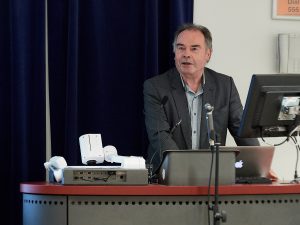Jo Holloway, who graduates with an MA Creative Writing this week, discusses her time at Birkbeck and how her course has helped her to develop her writing career.
When I decided to undertake a master’s degree, I always knew it would be at Birkbeck. I work full time, so the evening classes and part-time courses were perfect for me. However, unlike many people, I wasn’t sure what I wanted to study. I considered History (which was the subject of my first degree) or a Master’s in Education (I’m a teacher so this would have helped professionally), but then I realised there was one thing I’d been working on for a number of years: a novel. Everyone has at least one in them apparently, but writing mine had been a struggle, and that’s putting it mildly. I had several beginnings of various stories, one that had stalled at the halfway point. I just had no idea where to take it. I realised what I wanted was guidance, expertise and feedback on my writing so that I would know, hopefully, that what I was writing wasn’t absolute rubbish! And so I applied to study for a Master’s in Creative Writing. Was it the right choice? Definitely.
During the course, I completed modules in reading and writing short stories, screenwriting, genre and a final workshop where I began to put together the backbone of my dissertation, which I completed over the summer. Each module complemented the others and taught me about point of view, structure, character, dialogue and the many other components that make a story. We read and discussed a variety of texts including David Mitchell’s Cloud Atlas, the screenplay of The King’s Speech, and short stories by authors such as Chimamanda Ngozi Adichie, Ali Smith and Raymond Carver to name but a few. Above all, we wrote. During the first unit, I wrote three short stories to be critiqued by my peers. The feedback that I received was invaluable. It allowed me to improve my stories and have more confidence in my ability as a writer. Two of the stories I workshopped during this unit have been published, one online and one in print in the Mechanics’ Institute Review, Birkbeck’s annual anthology of short stories.
 While I’m talking about the Mechanics’, it seems appropriate to mention the other opportunities outside the taught units that were available to me during my MA. Birkbeck’s anthology of short stories is an Arts Council-funded project, open to all writers across the country. Not only have I had the pleasure of being published in the anthology, it also led to reading my work at the MIR live events, which was a wonderful (if slightly terrifying) experience. And then there’s the wealth of expertise that was shared with us. Prior to the course, I would have had no idea about how to approach an agent or publisher, or what to expect from the editing process. But now, I feel much more confident with this aspect of being an author too.
While I’m talking about the Mechanics’, it seems appropriate to mention the other opportunities outside the taught units that were available to me during my MA. Birkbeck’s anthology of short stories is an Arts Council-funded project, open to all writers across the country. Not only have I had the pleasure of being published in the anthology, it also led to reading my work at the MIR live events, which was a wonderful (if slightly terrifying) experience. And then there’s the wealth of expertise that was shared with us. Prior to the course, I would have had no idea about how to approach an agent or publisher, or what to expect from the editing process. But now, I feel much more confident with this aspect of being an author too.
As for my ambition of finally finishing writing a novel, I am well on my way. The dissertation for the final unit of the MA was the first 15,000 words of my young adult sci-fi novel. After handing it in I am now in the process of writing the rest of it and aim to have a completed draft by the end of the year. Best of all, through the wonderful people that I have met on the course, my novel continues to be workshopped in a writing group formed of several graduates from the Creative Writing MA. I honestly loved studying for my master’s, and it has given me a great foundation on which to build my writing career.



